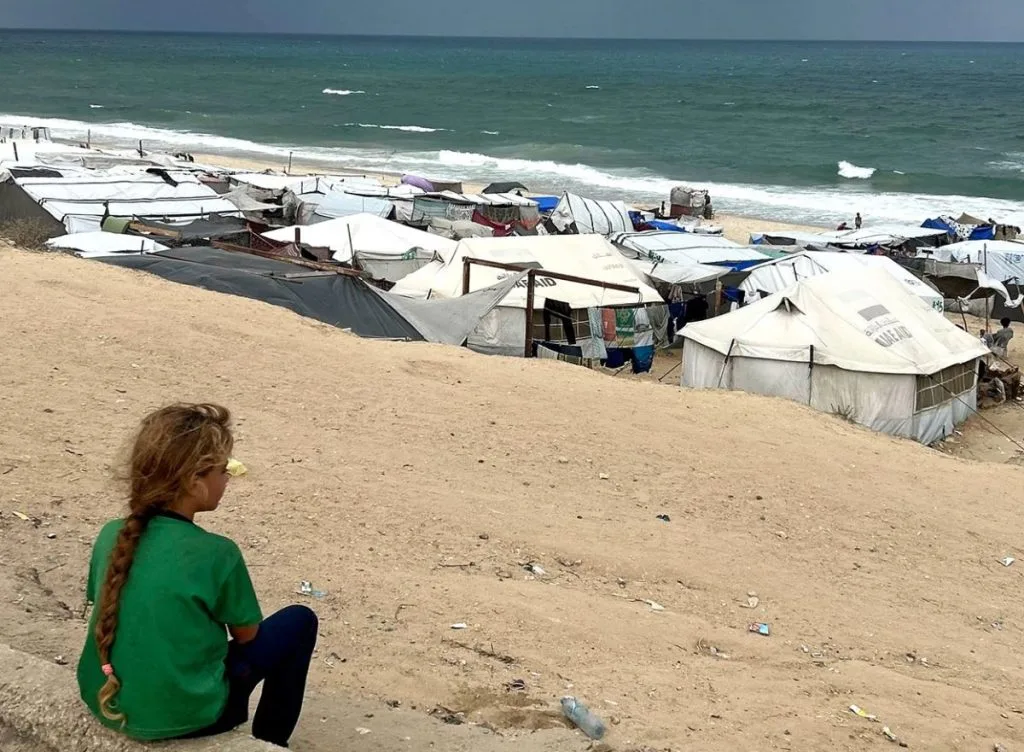As temperatures drop and rains begin, hundreds of thousands of displaced Palestinians confront life in failing tents with no protection from the elements.
BY SERENA AWAD, American Friends Service Committee, OCT 31, 2024

As the genocide in Gaza continues unabated, winter is fast approaching and threatening to worsen the catastrophe. Hundreds of thousands of Palestinians in Gaza are desperate for any form of shelter. They are living in makeshift tents after being forced to flee multiple times, leaving behind whatever is left of their homes—mostly reduced to rubble.
Made from scrap fabric, thin tarps, wood, and nylon, these tents have endured over a year of harsh sun and constant relocation. Most are no longer suitable due to wear and tear. They will offer no protection from the harsh weather that looms ahead.
An estimated “74% of the tents of the displaced people have become unfit for use,” according to the Government Media Office in Gaza. The government field assessment teams informed us that “100,000 tents out of 135,000 need immediate and urgent replacement due to their complete deterioration.”
Winter hasn’t even started yet in Gaza, but it has rained multiple times already. Flooding has been everywhere on every street, tents were drowned, and some were leveled to the ground. The tents have no foundations or solid roofs, just fragile coverings easily torn by the wind and saturated by water. Strong winds are especially a problem for the hundreds of worn-out tents next to the beach, where the wind blows the tents off the ground. People in Gaza have found themselves not just drenched but freezing with nowhere to escape the cold and almost certainly getting sick.
Last winter brought misery, but this year is far worse. Last winter, many people still had homes to shelter in, at least partially. But now, after a year of genocide, no homes remain. Entire neighborhoods in Rafah, Jabalia, northern Nuseirat, and whatever was left in Khan Younis have been completely wiped out.
It is not only homes that have been destroyed, but also the shelters people once relied on, including mosques, schools, and even hospitals. There are no safe or warm havens left.
I am the kind of person who gets cold quickly and cannot bear low temperatures. Now, being displaced next to the beach with no warmth or enough clothes, I am unsure how I will survive the winter, the cold, displacement, and the bombs.
Still, Israel continues to keep the borders closed and is letting less humanitarian aid into Gaza than ever before. “At least 1.13 million people need sealing-off kits, and 1.34 million need bedding kits before winter,” according to the U.N. Office for the Coordination of Humanitarian Affairs. But right now, Israel is blocking a quarter of a million tents and any kind of shelter from entering Gaza. That includes tents from UNICEF that AFSC was planning to distribute in areas where we work.
Desperation is palpable. The markets are bare. There are no blankets, winter clothes, or fuel and gas for generators or heaters or wood to burn to help people endure the cold nights ahead. The few available items are priced beyond reach as supplies dwindle.
I recently met a woman in one of the makeshift camps whose story deeply impacted me. She told me the rain came suddenly one afternoon, soaking everything in her tent. As the ground turned to mud, she slipped and fell, breaking her arm. With no proper medical care, her injury took a long time to heal. She is one of many who will face the deadly combination of cold, rain, and complete neglect in the coming months. The reality of winter is already here; people are drowning in the rain before it has even properly begun.
Winter in Gaza is not just another season; it is an additional layer of suffering in a place already devastated beyond recognition. For those living in tents, each cold gust of wind is a reminder that they are not safe and have nowhere to go. Families will soon find themselves drowning, not in floodwater alone, but in a tide of hopelessness that the world seems determined to ignore.
The coming months will be an unbearable existence for Palestinians in Gaza who have already endured unimaginable suffering. Still, the truth is that no one can survive the freezing cold in nothing but a tent.
The question we face now is: How will anyone survive in the coming months?
As Palestinians in Gaza face even harsher conditions ahead, it is critical that people in the U.S. do all that they can to save lives. Please keep urging your elected officials to stop military assistance to Israel and demand humanitarian access for Gaza.
Leave a Reply
You must be logged in to post a comment.